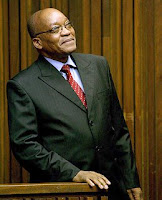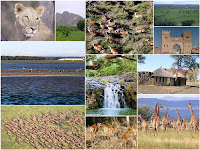Jacob Zuma
 Jacob Zuma was born on 12 April 1942 in Inkandla, KwaZulu-Natal Province.
Jacob Zuma was born on 12 April 1942 in Inkandla, KwaZulu-Natal Province.His father died at the end of World War II, after which his mother took up employment as a domestic worker in Durban. He spent his childhood moving between Zululand and the suburbs of Durban, and by age 15 took on odd jobs to supplement his mother?s income.
Owing to his deprived childhood, Jacob Zuma did not receive any formal schooling. Heavily influenced by a trade unionist family member, he became involved in politics at an early age and joined the African National Congress in 1959. He became an active member of Umkhonto We Sizwe in 1962, following the banning of the ANC in 1960.
While on his way out of the country in 1963, he was arrested with a group of 45 recruits near Zeerust in what was then the western Transvaal (now the Northern West Province). Convicted of conspiring to overthrow the government, he was sentenced to 10 years' imprisonment, which he served on Robben Island.
After his release, Jacob Zuma helped mobilise internal resistance and was instrumental in the re-establishment of ANC underground structures in the then Natal province, (KwaZulu-Natal) between 1973 and 1975.
He left South Africa in 1975 and for the next 12 years, based first in Swaziland and then Mozambique, dealt with thousands of young exiles who poured out of South Africa in the wake of the Soweto uprising.
He lived in several African countries working for the ANC, where he rose rapidly through the ranks to become a member of the ANC National Executive Committee in 1977. He also served as Deputy Chief Representative of the ANC in Mozambique, a post he occupied until the signing of the Nkomati Accord between the Mozambican and South African governments in 1984. After signing the Accord, he was appointed as Chief Representative of the ANC and was one of a few who remained in Mozambique to carry out the work of the organisation, crossing in and out of South Africa on a number of occasions.
Jacob Zuma was forced to leave Mozambique in January 1987 after considerable pressure on the Mozambican government by the PW Botha regime. He moved to the ANC Head Office in Lusaka, Zambia, where he was appointed Head of Underground Structures and shortly thereafter Chief of the Intelligence Department.
He served on the ANC?s political and military council when it was formed in the mid-80s. Read more
More Jacob Zuma: TIME 100, BBC, Bizcommunity, Biography, Soulful Tributes, Wikipedia


